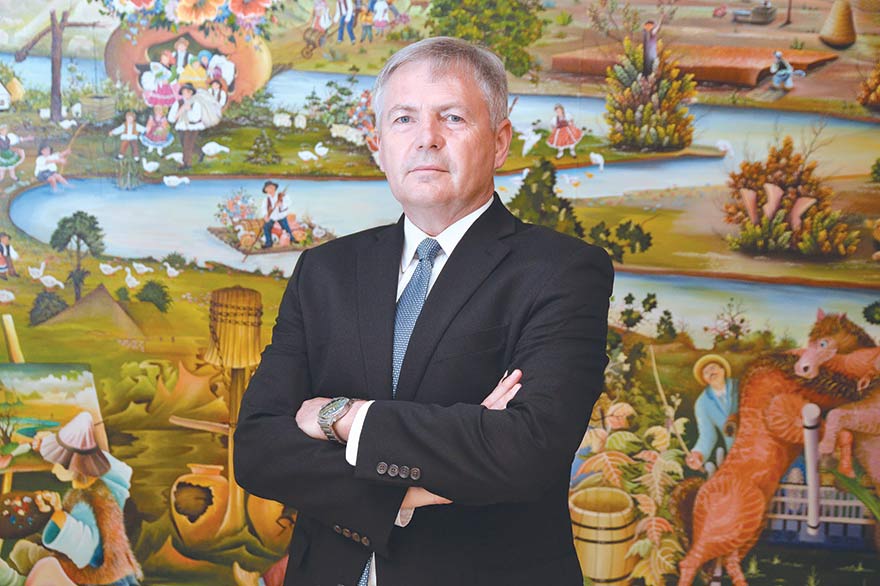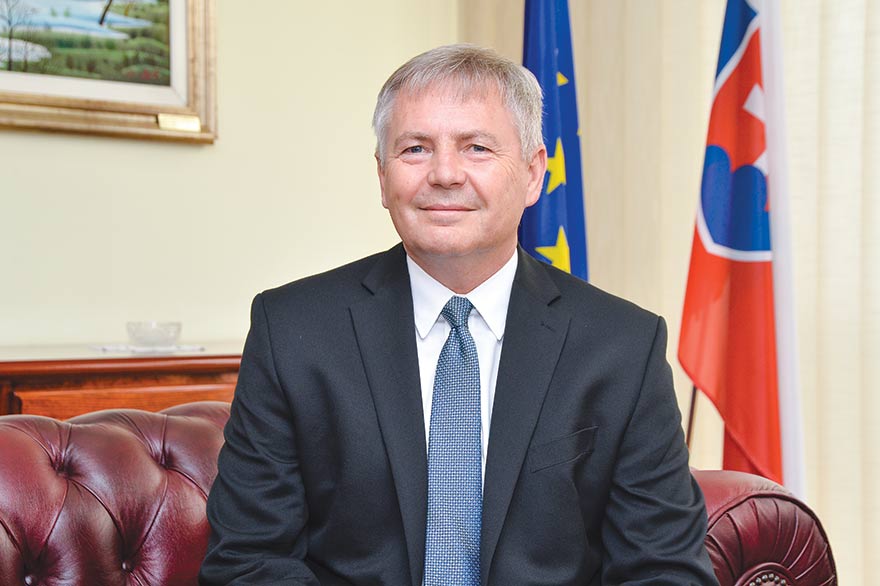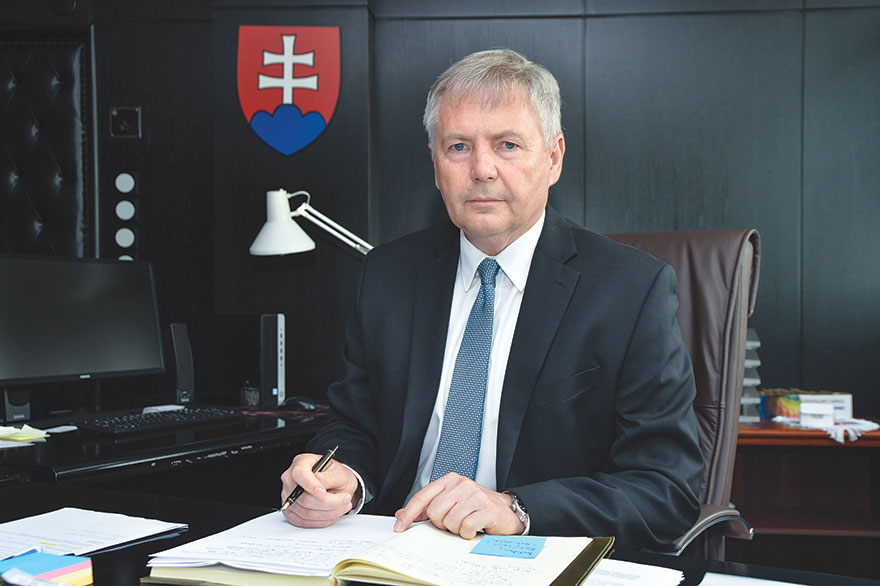Within Chapter 35 there are particular criteria that have to be fulfilled regarding the normalisation process with Priština, but recognition per se is not mentioned anywhere, neither in this concrete chapter nor in the whole negotiating framework (with the EU) – Fedor Rosocha
The new ambassador of Slovakia to Serbia, H.E. Fedor Rosocha, hopes that his countryman and fellow diplomat with experience in the region, Miroslav Lajčak, will be able to bring Belgrade and Priština into the position to sign a comprehensive agreement on the normalisation of relations. In this interview for CorD Magazine, Ambassador Rosocha says that Slovakia supports that dialogue whilst maintaining the decision it made in 2007 not to recognise the unilaterally declared independence of the breakaway Serbian province. One of Ambassador Rosocha’s key priorities that is currently being hampered by the Coronavirus pandemic is the organising of meeting between the presidents of Serbia and Slovakia, given that such a conversation at the highest level hasn’t been held since 2013.
Your Excellency, you arrived in Serbia at the time of an unprecedented event in the form of the COVID-19 pandemic. How much did that fact impact on your choice of priorities for your term in Serbia?
Well, this pandemic is certainly such an unprecedented event that it had its severe impact on everybody and everywhere all over the world, including the Slovak Embassy in Serbia. I arrived in Belgrade at the beginning of this year and everything literally changed after just a couple of weeks. All of the events we had previously planned – be they various exhibitions, concerts or sports tournaments – had to be cancelled. However, my long-term priorities shall remain the same: strengthening political and economic cooperation between Slovakia and Serbia; supporting Serbia’s EU accession process; and paying close attention to the position of the well-established Slovak national minority living in Vojvodina. These are all things that have to remain in our focus regardless of the pandemic.
Based on your initiative, Slovakia donated 50,000 euros to the City of Novi Sad for the fight against COVID-19. You also simultaneously handed over a donation to the Children’s Clinic in Tiršova Street in Belgrade. What is the situation like in Slovakia now that autumn is on its way when a new wave of the pandemic has been announced?
Regarding the overall number of positive cases, Slovakia has been doing fairly well. Even in the spring months, when we still knew very little about the virus and almost all countries adopted drastic measures in order to reduce its capability to spread, Slovakia established itself as a country with a very low number of infected or hospitalised cases. And I’m now glad to say that we are still pretty much able to hold this position. Nevertheless, with open borders and people going on summer holidays, it is quite natural that the numbers are growing even in Slovakia, although – at least until now – this growth has not been particularly fast and we’re still keeping the situation under control, with approximately 50 new cases per day.
My long-term priorities shall remain the same: strengthening political and economic cooperation between Slovakia and Serbia; supporting Serbia’s EU accession process; and paying close attention to the position of the well-established Slovak national minority living in Vojvodina
After submitting your credentials to the President of Serbia, you were asked to convey an invitation for Slovakian President Zuzana Čaputová to visit Serbia. Is work being done to arrange such a visit and, given the circumstances, can that be realised in the near future?
Bilateral political contacts between our two countries have always been very close and intense. However, the last meeting at the presidential level took place quite a long time ago, in 2013. It is thus quite natural that a potential visit of President Čaputová to Serbia belongs among our key priorities. The President is very well aware of the importance that Serbia plays, as our biggest and most crucial partner in the Western Balkan region. Various challenges that the European Union has been facing recently, a new methodology regarding the accession process, renewed dialogue between Belgrade and Priština – these all are topics of great importance, and I firmly believe that the presidents of our two countries should have an opportunity to discuss them in person soon.

It is believed in Serbia that Slovakia is under pressure to reconsider and amend its decision not to recognise Kosovo’s independence. What is Bratislava’s stance on this issue at present?
I am not so sure that this is exactly what the Serbian public thinks when it comes to Kosovo. There has been talk about pressure and various incentives to the so-called “non-recognisers” for years, and still, nothing has happened. Our position has always been the same. It is rooted in the Declaration of the National Council of the Slovak Republic adopted in March 2007 that territorial disputes shall never be resolved unilaterally and against the principles of international law, and so we still have no reason to change our perception of the Kosovo issue. On the other hand, Slovakia is clearly interested in the social and economic development of Kosovo, our development aid programmes have been present in various regions of Kosovo for years, but this does not mean recognition.
Do you believe that your countryman and former foreign minister Miroslav Lajčak, who is now the EU Special Representative for the Belgrade-Priština Dialogue, will be able to substantially reinvigorate the dialogue on the normalisation of relations?
This is a thing I cannot stress strongly enough. I am extremely satisfied that our former FM Miroslav Lajčak succeeded in bringing representatives of both Belgrade and Priština back to the negotiating table, as dialogue is the only way forward. I do hope sincerely that we will get closer to a comprehensive agreement on normalising relations between Serbia and Kosovo in the near future. Of course, renewal of the dialogue is one thing and signing an agreement is completely different, but let us all bear in mind that the dialogue itself has been suspended for almost two years and if the parties do not talk to each other there is simply no chance any progress could be achieved whatsoever.
It is rooted in the Declaration of the National Council of the Slovak Republic adopted in March 2007 that territorial disputes shall never be resolved unilaterally and against the principles of international law, and so we still have no reason to change our perception of the Kosovo issue
Members of the Visegrad Group support EU enlargement and Serbia’s entry into the Union. How do you see Serbia’s membership in the EU: as a real possibility or as a prospect for the future?
You are right that Slovakia, together with its closest neighbours, firmly supports not only the Serbian accession process but also the broader European perspective of the whole region of the Western Balkans. Prospects for the future and a real possibility are not two things that are mutually exclusive; on the contrary, firstly you have to have prospects for membership in the future, then later – when all the criteria have been fulfilled successfully – a real possibility should materialise. It is not just my personal opinion that the European project cannot be considered complete without all of the candidates being granted full membership and thereby forming a broadly integrated European family. As such, Slovakia most definitely perceives Serbia as a future EU member – and now the speed at which you can make progress depends primarily on your capabilities and energy.

With five EU member states, including Slovakia, having not recognised Kosovo’s independence, can the EU set the condition of recognising Kosovo as a state in order for Serbia to join the EU? This is often cited as a key condition that Belgrade must meet.
As you should know, there is no such condition currently. Within Chapter 35 there are particular criteria that have to be fulfilled regarding the normalisation process with Priština, but recognition per se is not mentioned anywhere, neither in this concrete chapter nor in the whole negotiating framework. The normalisation of relations, the adoption of a comprehensive and sustainable agreement, is not the same as recognition. Yes, Belgrade has to normalise its relations with Priština, this is a clear condition you have to bear in mind, and at the end of the day that will only help all people living in Kosovo, regardless of their nationality. My advice would be to focus on the dialogue that has recently been re-established and try to achieve as much as possible within this process.
Within Chapter 35 there are particular criteria that have to be fulfilled regarding the normalisation process with Priština, but recognition per se is not mentioned anywhere, neither in this concrete chapter nor in the whole negotiating framework
The President of Serbia advocates in favour of stronger cooperation with the Visegrad Group. Do you believe that the experience of more closely connecting Slovakia, Czechia, Hungary and Poland could be applied in the Western Balkans?
Central Europe is a region with a somewhat different historical experience. Luckily, we have no history of recent armed conflicts, which makes our mutual cooperation much smoother. I understand that it might be quite complicated for the former Yugoslav republics to achieve the same level of partnership as we have since there are still many open wounds and unresolved issues from the past that have a great influence on politicians and people in all of the countries of this neighbourhood. Nevertheless, cooperation is the only way forward, and the sooner you try to forget the past and look to the future, the better it will be for everyone. No matter how complicated the history might be, the peoples of Serbia, Croatia, Bosnia and other countries in the region will always live here side by side – and you will probably agree with me that it is always better to cooperate and deepen mutual integration than to search for reasons why such integration cannot be possible.
Hungarian Prime Minister Viktor Orbán once proposed that the Visegrad Group be expanded to include Romania and Serbia, with which a strong political and economic alliance in Central and Eastern Europe would be created. How do you view such ideas about new connections both within and beyond the EU?
After the Visegrad countries joined the EU, the foreign policy activities of the Group increased considerably. Visegrad did not hesitate to become involved in broader forms of regional cooperation. Areas of common interest have been discussed with potential partners, such as internal security issues, matters relating to borders, questions of asylum, consular matters, culture and the creation of common infrastructure projects. Other prospective areas include inter-parliamentary contacts, exchange programmes and consultation between other institutions. The Slovak Republic considers the Visegrad Group as a key element in promoting regional political and economic cooperation in Central and Eastern Europe. It sees its significance in concrete projects, as well as in political cooperation wherever the will exists, including in Serbia and Romania.
The Slovak Republic considers the Visegrad Group as a key element in promoting regional political and economic cooperation in Central and Eastern Europe
Is there room to strengthen economic cooperation between Slovakia and Serbia, which is lagging behind the excellent political relations between the two countries?
As you rightly said, the political relations between our countries are at an excellent level. After a turbulent period in the Western Balkans in the 1990s and democratic changes in Serbia after 2000, economic and trade cooperation has experienced new dynamics, in particular in the field of energy projects, transport infrastructure, environmental protection, agricultural production and technology-intensive sectors. The challenge for both countries is to develop innovation and the development of new technologies, where prospective partnerships can emerge. We are also interested in the development of tourism. In this regard, the intergovernmental Slovak – Serbian Commission for Economic Cooperation also makes a significant contribution to increasing mutual economic cooperation.

At the start of your term in Serbia, you agreed with the assessment of the Serbian President that Slovaks resident in Serbia represents a special link between the two countries. How do you see the position of that community today?
In the development of our bilateral relations, the Slovak Republic attaches great importance to the equal standing of the Slovak national minority in Serbia. We welcome the active involvement of the Serbian government in solving both the everyday issues and long-run problems that the Slovak minority may face, whether in the fields of education or minority media, but also their representation in local offices. We believe that the constructive position of the Serbian authorities will continue to prevail in mutual communication. I am also aware of challenges requiring special attention. In particular, a priority should be given to the topics of young generation employment, career prospects and wage growth, effective education and the care for young families, so that Serbia remains the country where local Slovaks see their future.
The media have reported that you also speak Serbian. When did you learn our language?
It is a very natural thing that the diplomatic representative of a foreign state should learn the language of the country to which they have been posted. For me, it has not been that difficult, since the Slovak and Serbian languages belong to the same language group, and although they are definitely not languages that are the same, their level of similarity is quite high. I started learning Serbian a couple of months before I left Slovakia and am currently regularly reading a Serbian textbook that I have in my office, learning new vocabulary and improving my grammar. I also read newspapers and watch Serbian TV every day. I really like the language and see that visible improvement always comes with learning.
| NEGOTIATIONS
I am extremely satisfied that our former FM Miroslav Lajčak succeeded in bringing representatives of both Belgrade and Priština back to the negotiating table |
ADVICE
My advice would be to focus on the dialogue that has recently been re-established and try to achieve as much as possible within this process. |
CHALLENGE
The challenge for both countries is to develop innovation and the development of new technologies, where prospective partnerships can emerge |
|---|